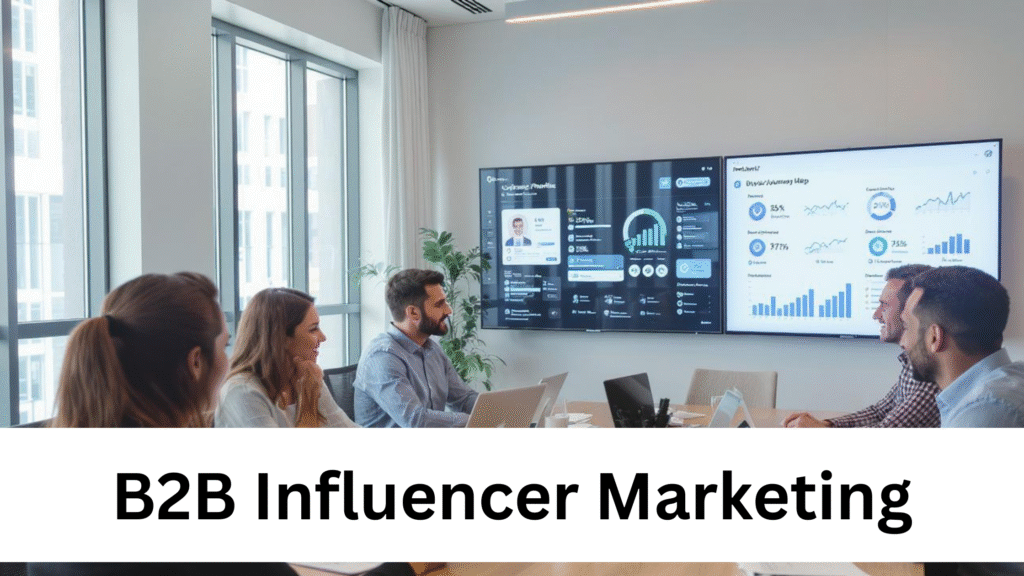In the modern business landscape, B2B Influencer Marketing has evolved into one of the most impactful strategies for building credibility, driving engagement, and generating leads. Unlike traditional advertising, which focuses on visibility, influencer marketing in the B2B space thrives on expertise and authority. When industry professionals share authentic insights about a brand’s products or services, their influence turns knowledge into measurable marketing success.

The Value of Expertise in B2B Influence
B2B buyers prioritize informed decisions. They look for credible sources who understand industry challenges and can offer solutions backed by experience. This is why expert-driven influence holds far greater value than simple promotions. B2B influencers, often subject-matter specialists or thought leaders, bring authority and depth to brand messaging that traditional marketing channels struggle to achieve.
By collaborating with these experts, brands gain a platform to demonstrate value and innovation through trusted voices. Their expertise transforms abstract brand claims into actionable insights, making them powerful allies in driving awareness and conversion.
From Awareness to Advocacy
The ultimate goal of B2B influencer marketing is not just visibility—it’s advocacy. While awareness brings attention, advocacy inspires action. When influencers genuinely believe in a brand’s mission or solution, they naturally become advocates who promote the brand organically through their professional channels.
Advocacy-based marketing builds deeper trust. Instead of a one-time promotional post, influencers integrate the brand into their long-term conversations, podcasts, webinars, or thought leadership content. This sustained visibility creates continuous engagement that strengthens the brand’s authority over time.
Storytelling Through Experience
Experience-driven storytelling is at the heart of successful B2B influencer marketing. When industry experts share personal stories about how a product or service solved a real problem, it resonates with decision-makers on a practical level. These authentic stories make technical information relatable and persuasive.
Storytelling transforms data into emotion, and emotion drives memory. By weaving brand messages into authentic narratives, influencers help businesses connect with their audience beyond the transactional level—establishing trust that lasts throughout the buyer journey.
Collaboration That Drives Innovation
Collaborating with influencers opens doors to innovation. These experts often bring fresh ideas, market insights, and audience feedback that brands can use to refine their strategies. Co-developing webinars, educational guides, or product reviews with influencers not only enhances credibility but also generates valuable content that demonstrates leadership.
Such collaborations build bridges between brands and their target audiences, positioning companies as forward-thinking problem solvers. This partnership model fuels innovation both in marketing strategy and product evolution.
Humanizing Complex B2B Narratives
One of the greatest challenges in B2B marketing is communicating complex value propositions in a relatable way. Influencers play a vital role in simplifying technical jargon and transforming it into accessible insights. Their ability to translate technical solutions into real-world benefits makes them essential for humanizing B2B communication.
When experts discuss brand solutions through the lens of real challenges, they make information digestible, actionable, and trustworthy. This clarity empowers potential buyers to see tangible value and accelerates the decision-making process.
Trust as the Cornerstone of Influence
Trust defines the success of every influencer relationship. In B2B environments where purchasing decisions impact entire organizations, the need for trust multiplies. Influencers act as trust ambassadors who validate brand credibility through their expertise and reputation.
By consistently providing accurate information, unbiased reviews, and professional insights, influencers strengthen the trust bridge between brands and audiences. This trust drives engagement, retention, and ultimately, long-term partnerships.
Leveraging Data to Identify the Right Influencers
Data analytics now plays a crucial role in influencer selection and performance measurement. Instead of relying on follower counts, brands evaluate engagement quality, relevance, and alignment with business goals. Tools that analyze social activity, audience demographics, and content resonance help marketers identify influencers who truly drive impact.
Data also enables brands to measure ROI effectively. Metrics like engagement rate, lead conversions, and brand sentiment help businesses refine their influencer strategies for better outcomes.
The Role of Micro and Nano Influencers
While top-tier influencers hold vast reach, micro and nano influencers are gaining traction for their niche expertise and close-knit audiences. These smaller influencers often enjoy stronger engagement and authenticity, making them ideal partners for specialized industries.
Brands that work with micro-influencers can create targeted, high-impact campaigns that resonate deeply within specific professional communities. This approach prioritizes quality over quantity, ensuring each collaboration drives meaningful engagement.
Integrating Influencers into Content Strategy
B2B influencer marketing performs best when seamlessly integrated into broader content strategies. Influencers can contribute to blogs, case studies, event panels, or podcasts—each reinforcing the brand’s authority within its domain.
By combining influencer insights with company-driven storytelling, brands create a unified message that resonates across digital platforms. This integration amplifies brand visibility, drives lead generation, and enhances audience trust.
The Future of B2B Influence
The future of B2B influencer marketing lies in the fusion of data, authenticity, and expertise. As industries continue to evolve, the role of influencers will expand from content collaborators to strategic partners in business growth. Their ability to merge human connection with analytical precision will make them indispensable to brands seeking sustainable engagement and authority.
